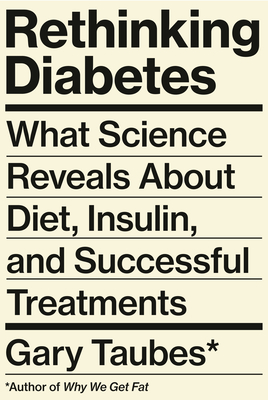
An eye-opening investigation into the history of diabetes research and treatment by the award-winning journalist and best-selling author of Why We Get Fat • "[Gary] Taubes’s meticulous, science-based work makes him the Bryan Stevenson of nutrition, an early voice in the wilderness for an unorthodox view that is increasingly becoming accepted."—Niel Barsky, The Guardian Before the discovery of insulin, diabetes was treated almost exclusively through diet, from subsistence on meat, to reliance on fats, to repeated fasting and near-starvation regimens. After two centuries of conflicting medical advice, most authorities today believe that those with diabetes can have the same dietary freedom enjoyed by the rest of us, leaving the job of controlling their disease to insulin therapy and other blood-sugar-lowering medications. Rather than embark on “futile” efforts to restrict sugar or carbohydrate intake, people with diabetes can lead a normal life, complete with the occasional ice-cream cake, side of fries, or soda. These guiding principles, however, have been accompanied by an explosive rise in diabetes over the last fifty years, particularly among underserved populations. And the health of those with diabetes is expected to continue to deteriorate inexorably over time, with ever-increasing financial, physical, and psychological burdens. In Rethinking Diabetes, Gary Taubes explores the history underpinning the treatment of diabetes, types 1 and 2, elucidating how decades-old research that is rife with misconceptions has continued to influence the guidance physicians offer—at the expense of their patients’ long-term well-being. The result of Taubes’s work is a reimagining of diabetes care that argues for a recentering of diet—particularly, fewer carbohydrates and more fat—over a reliance on insulin. Taubes argues critically and passionately that doctors and medical researchers should question the established wisdom that may have enabled the current epidemic of diabetes and obesity, and renew their focus on clinical trials to resolve controversies that are now a century in the making.
Author

Gary Taubes is an American science writer. He is the author of Nobel Dreams (1987), Bad Science: The Short Life and Weird Times of Cold Fusion (1993), and Good Calories, Bad Calories (2007), titled The Diet Delusion (2008) in the UK and Australia. His book Why We Get Fat: And What to Do About It was released in December 2010. In December 2010 Taubes launched a blog at GaryTaubes.com to promote the book's release and to respond to critics. His main hypothesis is based on: Carbohydrates generate insulin, which causes the body to store fat. Taubes studied applied physics at Harvard University (BS, 1977) and aerospace engineering at Stanford University (MS, 1978). After receiving a master's degree in journalism at Columbia University in 1981, Taubes joined Discover magazine as a staff reporter in 1982. Since then he has written numerous articles for Discover, Science and other magazines. Originally focusing on physics issues, his interests have more recently turned to medicine and nutrition. Taubes' books have all dealt with scientific controversies. Nobel Dreams takes a critical look at the politics and experimental techniques behind the Nobel Prize-winning work of physicist Carlo Rubbia. Bad Science is a chronicle of the short-lived media frenzy surrounding the Pons-Fleischmann cold fusion experiments of 1989. [wikipedia]